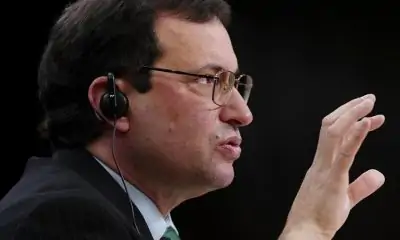A memo reviews the city’s six year-old plan to address housing and homelessness and calls for a dramatic “refresh” of that strategy.
Investment
Urgent investment needed to increase affordable housing supply: Ottawa mayor – Ottawa Citizen

Homeless and hungry in downtown Ottawa.
Urgent investment from all three levels of government is needed to increase Ottawa’s supply of affordable housing, and to help homeless and disabled people find permanent homes that meet their needs, Mayor Jim Watson says.
The memo, signed by Watson and Councillors Jenna Sudds and Catherine McKenney, was issued late Tuesday on the eve of a debate about whether to declare a city-wide emergency on affordable housing and homelessness.
The memo reviews the city’s six year-old plan to address housing and homelessness and calls for a dramatic “refresh” of that strategy.
In the next 10 years, it suggests, the city should create between 5,700 and 8,500 affordable housing units and financial subsidies, while also ensuring that 20 per cent of those are devoted to supportive and accessible housing. It also calls on the city to preserve its existing stock of Ottawa Community Housing units.
The proposal sets out some ambitious goals: to reduce overall homelessness by 25 per cent and to eliminate “unsheltered” homelessness — people living on the streets.
“The refreshed plan is aspirational in nature and requires the commitment of significant new funding from all levels of government in order to be realized,” the memo says. “Without an injection of increased, sustained and long-term funding, the plan will not achieve its ambitious outcomes.”
The city will spend $109 million on housing and homelessness this year, which means the cost of the refreshed plan cannot be absorbed by municipal property taxpayers alone, Watson said. In the past two budgets, the city has committed $30 million in capital for new affordable housing developments.
The province will contribute $43 million and the federal government $27 million to affordable housing and homelessness initiatives in Ottawa in 2020.
Last month, McKenney put colleagues on notice that she will ask for their support to declare an emergency on affordable housing and homelessness. Council is to debate her motion Wednesday.
The city’s housing crisis has been created by a welter of issues, according to a review of the city’s 2014 housing and homelessness plan.
Funding for new affordable housing units has not kept pace with the city’s population growth that has forced Ottawa’s overall vacancy rate down to 1.8 per cent. That supply shortage has driven up prices: the average market rent in 2018 was $1,174 — a 15 per cent increase from 2014.
That means more people in community housing are holding onto their units longer, reducing the annual turnover. The centralized wait list for community housing has more than 10,600 households on it. Families can wait years for a spot, and some are spending longer periods in emergency shelters.
The lack of affordable housing has exacerbated the city’s homelessness problem. During the past six years, there has been a 23 per cent increase in the number of people requesting an emergency shelter placement. In 2018, the emergency shelter system operated, on average, at 108 per cent of its capacity.
Family homelessness, the report said, is the main driver of the increased demand at the city’s emergency shelters, and the reason why Ottawa increasingly is relying on hotels and motels to house the overflow.
More than 55,000 households in Ottawa — about 13 per cent of the population — live with the kind of low incomes that make housing a serious challenge. Canada Mortgage and Housing Corporation says Canadians should be spending no more than 30 per cent of their before-tax income on housing.
ALSO IN THE NEWS
Why are staff blowing whistles at every LRT station? A faulty camera system: sources
Crown, defence cite ‘anticipated issues’ as Ortis espionage case moves to Superior Court
Investment
Tesla shares soar more than 14% as Trump win is seen boosting Elon Musk’s electric vehicle company

NEW YORK (AP) — Shares of Tesla soared Wednesday as investors bet that the electric vehicle maker and its CEO Elon Musk will benefit from Donald Trump’s return to the White House.
Tesla stands to make significant gains under a Trump administration with the threat of diminished subsidies for alternative energy and electric vehicles doing the most harm to smaller competitors. Trump’s plans for extensive tariffs on Chinese imports make it less likely that Chinese EVs will be sold in bulk in the U.S. anytime soon.
“Tesla has the scale and scope that is unmatched,” said Wedbush analyst Dan Ives, in a note to investors. “This dynamic could give Musk and Tesla a clear competitive advantage in a non-EV subsidy environment, coupled by likely higher China tariffs that would continue to push away cheaper Chinese EV players.”
Tesla shares jumped 14.8% Wednesday while shares of rival electric vehicle makers tumbled. Nio, based in Shanghai, fell 5.3%. Shares of electric truck maker Rivian dropped 8.3% and Lucid Group fell 5.3%.
Tesla dominates sales of electric vehicles in the U.S, with 48.9% in market share through the middle of 2024, according to the U.S. Energy Information Administration.
Subsidies for clean energy are part of the Inflation Reduction Act, signed into law by President Joe Biden in 2022. It included tax credits for manufacturing, along with tax credits for consumers of electric vehicles.
Musk was one of Trump’s biggest donors, spending at least $119 million mobilizing Trump’s supporters to back the Republican nominee. He also pledged to give away $1 million a day to voters signing a petition for his political action committee.
In some ways, it has been a rocky year for Tesla, with sales and profit declining through the first half of the year. Profit did rise 17.3% in the third quarter.
The U.S. opened an investigation into the company’s “Full Self-Driving” system after reports of crashes in low-visibility conditions, including one that killed a pedestrian. The investigation covers roughly 2.4 million Teslas from the 2016 through 2024 model years.
And investors sent company shares tumbling last month after Tesla unveiled its long-awaited robotaxi at a Hollywood studio Thursday night, seeing not much progress at Tesla on autonomous vehicles while other companies have been making notable progress.
Tesla began selling the software, which is called “Full Self-Driving,” nine years ago. But there are doubts about its reliability.
The stock is now showing a 16.1% gain for the year after rising the past two days.
The Canadian Press. All rights reserved.
Investment
S&P/TSX composite up more than 100 points, U.S. stock markets mixed

TORONTO – Canada’s main stock index was up more than 100 points in late-morning trading, helped by strength in base metal and utility stocks, while U.S. stock markets were mixed.
The S&P/TSX composite index was up 103.40 points at 24,542.48.
In New York, the Dow Jones industrial average was up 192.31 points at 42,932.73. The S&P 500 index was up 7.14 points at 5,822.40, while the Nasdaq composite was down 9.03 points at 18,306.56.
The Canadian dollar traded for 72.61 cents US compared with 72.44 cents US on Tuesday.
The November crude oil contract was down 71 cents at US$69.87 per barrel and the November natural gas contract was down eight cents at US$2.42 per mmBTU.
The December gold contract was up US$7.20 at US$2,686.10 an ounce and the December copper contract was up a penny at US$4.35 a pound.
This report by The Canadian Press was first published Oct. 16, 2024.
Companies in this story: (TSX:GSPTSE, TSX:CADUSD)
The Canadian Press. All rights reserved.
Economy
S&P/TSX up more than 200 points, U.S. markets also higher

TORONTO – Canada’s main stock index was up more than 200 points in late-morning trading, while U.S. stock markets were also headed higher.
The S&P/TSX composite index was up 205.86 points at 24,508.12.
In New York, the Dow Jones industrial average was up 336.62 points at 42,790.74. The S&P 500 index was up 34.19 points at 5,814.24, while the Nasdaq composite was up 60.27 points at 18.342.32.
The Canadian dollar traded for 72.61 cents US compared with 72.71 cents US on Thursday.
The November crude oil contract was down 15 cents at US$75.70 per barrel and the November natural gas contract was down two cents at US$2.65 per mmBTU.
The December gold contract was down US$29.60 at US$2,668.90 an ounce and the December copper contract was up four cents at US$4.47 a pound.
This report by The Canadian Press was first published Oct. 11, 2024.
Companies in this story: (TSX:GSPTSE, TSX:CADUSD)
The Canadian Press. All rights reserved.
-

 News6 hours ago
News6 hours agoTime limits were meant to speed up justice. They also halt hundreds of criminal cases
-

 News3 hours ago
News3 hours agoWho will buy Infowars? Both supporters and opponents of Alex Jones interested in bankruptcy auction
-

 News3 hours ago
News3 hours agoTelus prioritizing ‘most important customers,’ avoiding ‘unprofitable’ offers: CFO
-

 News6 hours ago
News6 hours agoDonald Trump election sparks U.S. interest in move to Canada, say immigration lawyers
-

 News3 hours ago
News3 hours ago‘Big frustration’: How a limited MAID window affects Alzheimer’s patients
-

 News22 mins ago
News22 mins agoPort of Montreal employer submits ‘final’ offer to dockworkers, threatens lockout
-

 News3 hours ago
News3 hours agoEnvironment commissioner says Canada on track to miss 2030 emissions targets
-

 News6 hours ago
News6 hours agoIn the news today: N.S. votes: Tories to release platform today





















